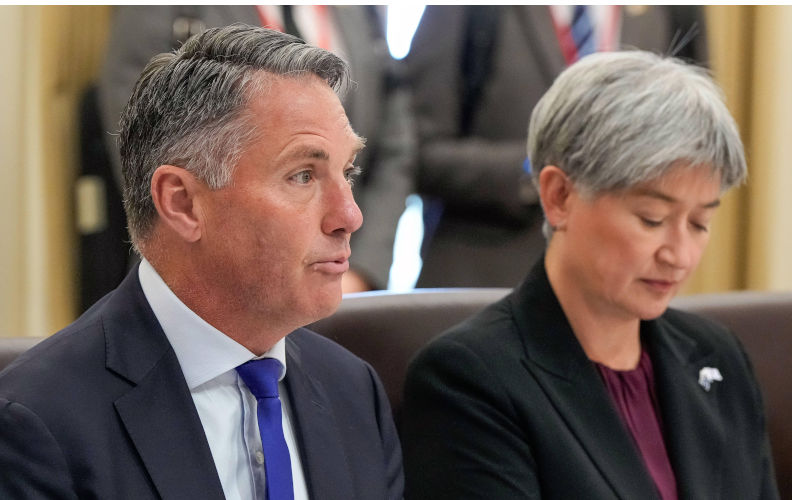Time for Foreign Minister Wong to put her foot down
July 19, 2025
In an ideal world, the Department of Foreign Affairs and Trade (DFAT) should be the government’s principal agency in seeing that relations with other countries best serve Australia’s interests.
In performing these tasks, DFAT can draw on its formidable supply of information and contributions from intelligence agencies, the departments of Defence, Treasury and, to a lesser extent, Home Affairs, among others.
As Foreign Minister Wong has said, she and her department should ensure that “diplomatic, economic, strategic and military capabilities are all going in the same direction".
While military capabilities are obviously important in helping to minimise the strategic risks to Australia’s interests, their scope, if not their nature, should to a significant degree be defined by what might not be achievable by diplomatic, economic and other means. The prime minister’s oft repeated trope about “dialogue” has a real point. That is to say, diplomacy and engagement should come first.
That fits with the general principles of the UN Charter about states not using force to resolve disputes and its prohibition on “the threat or use of force against the territorial integrity or political independence of another state".
It’s easy to scoff at the international rules-based order, especially when it comes off the worse in collisions with the interests of powerful nations. Nevertheless, as a recent article in the US journal Foreign Affairs points out, “The century that preceded World War II saw over 150 successful territorial conquests; in the decades afterward, there have been fewer than ten”, a history for which the UN Charter can take a share of the credit.
Moreover, the use of military force since 1945 too often has resulted in ugly stalemates through to full-blown catastrophes – Korea, India-Pakistan, Vietnam, Iran-Iraq, Ethiopia, Congo, Afghanistan, Ukraine, Israel-Gaza and many others. The satisfactions, such as they were, at the end of World War II now seem largely out of reach, while encompassing wars between nuclear-armed countries with their potential to obliterate life on the planet have been avoided.
The development of military capabilities should be kept in their place and they should fit within the diplomatic and other means of protecting the country’s interests, not the other way around.
While it’s hard to be precise, there are signs that over the last 10 years or so, Defence has had a more prominent place in Australia’s external relations than is warranted. How else to explain the creeping enfolding of the Australian military into that of the US or AUKUS for which no strategic justification has been provided?
Whatever, in the scramble for resources, Defence has done much better than DFAT. Of course, Defence will always have much more, but in the last 10 years its annual total resource allocation has increased very significantly in real terms while DFAT’s has remained static. You get what you pay for.
And this has happened while DFAT has had more stable and competent ministers than Defence – Bishop, Payne and Wong versus Johnston, Andrews, Payne, Pyne, Reynolds, Dutton and Marles.
In the new government, the foreign minister should assert her rightful place and that of her department. She’s smart and articulate, has dealt with her counterparts in other countries in a responsible and ungrovelling way. Defence Minister Marles, on the other hand, doesn’t seem to be able properly to manage his own office. leave alone the defence portfolio, and his cringing dealings with the US will not help relations with that country. He should also stop saying that the Chinese military build-up since 1945 is the biggest the world has ever seen, lest that obvious falsehood affects his strategic judgments and those of the hawkish elements who keep seeing a military stoush with China as being just around the corner.
It’s probably true that the international scene is rather more fraught than it’s been at certain times in the past. As the fruitcake US president excavates all moral sense from his government, he has turned his country into an unpredictable, selfish and unreliable ally with which Australia needs to find new ways to deal. It’s not evident Marles has the ability or willingness to make an effective contribution to that, especially given the enmeshing subordination of Australian defence forces with those of America and when his once guiding star, the Defence Strategic Review, is now largely redundant.
Wong should seize the hour and get the government to agree to:
- Give no more money to defence unless that can be fully justified by government-determined strategic risks in which she has played a major role in defining.
- Firmly re-iterate with the US that it’s wasting its breath with its stupid urging for Australia or any other country to peg defence spending to a proportion of GDP.
- Tell the US Australia would not join it in any military conflict with China over Taiwan.
- Find ways of quickly wriggling out of AUKUS and if the current US review concludes that price should be increased, be ready to use that as grounds for cancelling the deal.
So Minister Marles could be relieved to do what he may very well be good at, lighter duties that leave time for him to polish what is said to be a well-developed ego.
The views expressed in this article may or may not reflect those of Pearls and Irritations.

